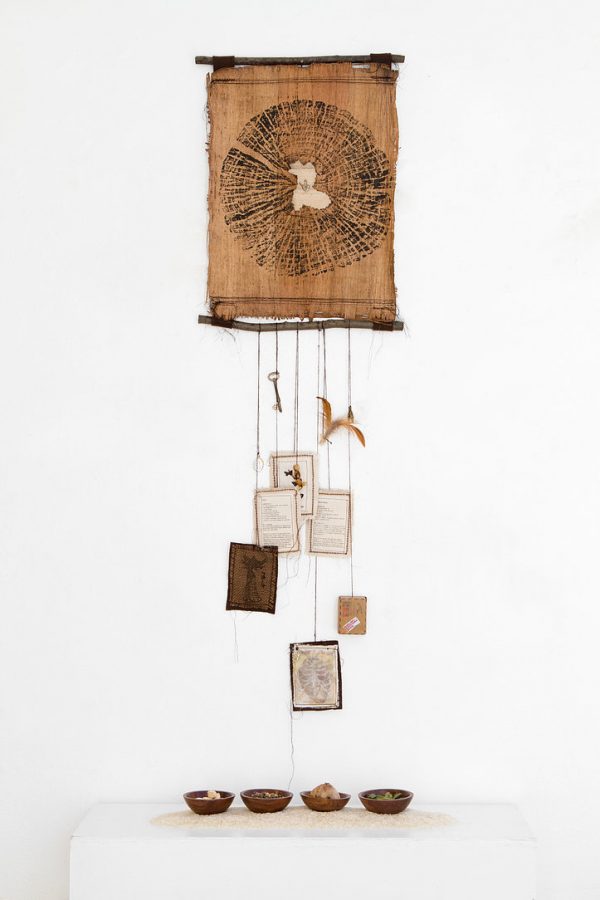Local artist, educator, community activist and art therapist Melissa Raman Molitor creates space to uplift work by APIDA artists
Courtesy of Melissa Raman Molitor
One of Molitor’s pieces entitled “Offering,” made on papyrus. Molitor is a local artist, art therapist, community activist and educator who recently launched the Kitchen Table Stories Project to center the voices and stories of the APIDA community.
April 21, 2021
A&E
Local artist, educator, community activist and art therapist Melissa Raman Molitor recognized there was no collective artistic space for the Asian Pacific Islander Desi American community in Evanston — so she decided to create one.
“The ultimate goal is to create collective power through art and to claim space in the community using stories and cultural wisdom,” Molitor said. “The purpose of the project is to center voices and stories of the local Asian and Pacific Islander diasporas.”
Her Kitchen Table Stories project showcases work by the APIDA community in Evanston and surrounding areas, giving them a sense of space and belonging. The project will launch on a virtual platform, but Molitor said there will be an exhibition next summer featuring artwork of all mediums by APIDA artists.
Molitor said her work stems from her own experiences of finding her identity. As the daughter of Filipino and Indian immigrants, she said she has had to navigate her hyphenated identity as a first-generation American.
“I am really interested in how we can use art to explore the search for identity in displaced spaces,” Molitor said. “My personal artwork connects to issues of colonialism, displacement, immigration, discrimination and racism.”
As someone who is a “perpetual foreigner,” Molitor said she wants to claim space that is generational so her children can build upon those roots as well — an idea that aligns with the mission of a nonprofit she founded called Kids Create Change. The nonprofit centers young people’s voices and promotes self-advocacy and activism through art.
Drawing from all of these experiences, Molitor said she decided last year to create Kitchen Table Stories, especially after the spike in anti-Asian racism once the pandemic began.
“There’s been an evolution of racism that has existed with regards to the pandemic, especially the increase in racism against Asians in America,” Molitor said.
Angela Lyonsmith, her colleague at the School of the Art Institute Chicago, said she admires Molitor’s passion for everything she does.
“It’s so important that she’s making these connections for (the APIDA community to) gather and nourish each other,” Lyonsmith said. “She’s an amazing artist… she’s a powerhouse.”
Lyonsmith also emphasized that Molitor had started working on Kitchen Table Stories for a year, before the recent string of anti-Asian hate crimes.
Jimmy Bulosan, another colleague of Molitor’s at SAIC, echoed Lyonsmith’s sentiments. He said the creation of a collective space for the APIDA community in the Evanston area is “long overdue.”
“She’s essentially creating spaces for forgotten people of society,” Bulosan said. “As a fellow Filipino, to see that in action and to see that come to life the way that she’s done it is one of those things that just falls in line with the fact that representation matters.”
Bulosan said he also admires Molitor’s ability to balance her many talents and titles while being a practicing mixed media artist at the same time. He said Molitor understands what art can do for people, especially if they’re struggling.
As Kitchen Table Stories continues to grow, Molitor hopes to further develop it to also include resources for the APIDA community. The Evanston Art Center recently awarded her the Curatorial Fellowship to expand upon the project. She said she wants the project to be ongoing, so there is a sense of permanence in the space she’s creating.
“I’m interested in the stories and the voices and the artwork that we traditionally find in the margins or that are not centered as the dominant narrative,” Molitor said. “Art as a method of healing justice is really the underlying foundation for this project.”
Email: [email protected]
Twitter: @laya_neel
Related Stories:
— A journey toward healing with poetry therapy
— Evanston artist Sarita Kamat talks her artistic journey from India to the U.S.












